Audiobooks for Students: Listening to What the Research Says
Audiobooks have grown increasingly popular but some educators are still hesitant to encourage their use. This may be a mistake.

People are listening to more audiobooks than ever before.
In 2021 an estimated 131 million people listened to an audiobook, and audiobook revenue is up more than 17 percent in the last two years. But despite their growing popularity audiobooks still often carry a stigma, particularly in education.
“There's this sense that it's cheating,” says Beth Rogowsky, Ed.D, associate professor at Bloomsburg University and author of Uncommon Sense Teaching: Practical Insights in Brain Science to Help Students Learn.
Rogowsky, a former K-12 English teacher, used to believe this as well. In fact, a few years ago when she got hooked on listening to audiobooks she was worried.
“I thought, ‘Wow, I'm really enjoying this. This is not good. I need to read this for it to count,’” she says.
Then Rogowsky decided to explore the science behind that assumption. For a 2016 study, she split 91 college-educated adults into three groups. One group listened to sections of the nonfiction history book Unbroken, another group read the same section on ebook readers, while the final group both read and listened at the same time. Afterward, participants were quizzed on how much material they had retained.
“What we found is it didn't matter whether these adults read the book from an e-tablet, listened to an audio version of the book, or did both simultaneously, comprehension was equal,” she says.
Tools and ideas to transform education. Sign up below.
Previous research also found adults got nearly identical scores on a test if they listen to passages instead of reading them.
While research into audiobooks' impact on children is more limited, Melissa Jacobs, director of The New York City Department of Education School Library System, has seen students respond well to them.
“I think that they comprehend at a much higher level listening than they do when they're reading text,” she says. “I find that a lot of kids have a very difficult time decoding text. And they lose out on the comprehension of a story, of a book, of a title because they're spending so much time focusing on decoding it.”
When the pandemic started, Jacobs began purchasing more ebooks and audiobooks and her library system now has more than 19,000 audiobooks available for students on OverDrive’s Sora K12 app. Over the summer, data from the app shows that students were spending about 45 minutes on average engaged with audiobooks, about twice the time they spent on average with an ebook.
But despite their potential, audiobooks are not perfect and research into their efficacy is ongoing.
Lingering Questions About Audiobook Efficacy
Rogowsky’s study compared listening to audiobooks to reading ebooks and there is some evidence that people retain more when reading a traditional print book instead of an ebook. It may also be harder to learn by listening the more complex a topic is. One study compared how well students learned about a scientific topic from a printed article versus a short podcast. Those in the reading group scored significantly higher than those in the listening group.
Age may also play a role. Participants in Rogowsky’s study were adults between 25 and 40 who had a bachelor’s degree and were proficient readers. Rogowsky says that with younger students, who are still developing their reading skills, there is the potential to overuse audiobooks. “That becomes an issue when instead of teaching our students how to read, we're letting them just listen to audiobooks for longer periods of time, especially in our English classes,” she says. But she adds audiobooks can still be useful with younger grades as it can help them learn to enjoy reading.
Jacobs says that “read along books,” which provide both text to read and audio, can be a useful tool with students still learning how to read. “For our younger kids, it provides a richer experience having that read along, “ she says. “Also for parents that don't speak or read in English, an audiobook or a read along helps them read with their child.”
Overcoming The Audiobook Stigma
Jacobs would like to see more educators embrace audiobooks and more school library systems invest in them.
“I feel like it needs to be a much more acceptable format and for educators to understand that it's not a cop-out,” she says. “ Not everybody is reading the text. And if you don't want kids to fall behind, and they need to read it, and you're on a timeline, and you have a curriculum map that you're following, and you have deadlines, give them the opportunity to get an accessible format that works for them. There's not a one-size-fits-all. Audio provides a different size that kids need.”
Jacobs had tried in the past to listen to audiobooks but had trouble concentrating on them. However, when she started adding more audiobooks to her library system after the pandemic started, she gave the format another try, but this time she tweaked the playback settings.
“I increase the speed of the narration of the reader, and it's changed my level of focus, and my ability to listen and actually enjoy an audiobook,” she says.
Rogowsky says that to overcome the stigma associated with audiobooks more people need to go public with their listening habits, just like Jacobs.
“The way we're gonna get past that is by more people sharing that, 'Yes, it's not a dirty little secret, I listened to the book rather than read it,'” she says. “Be proud of that, because you're making great use of this downtime. And the way you're going to remember more of what you read or listen to is by talking about it with other people.”
Erik Ofgang is a Tech & Learning contributor. A journalist, author and educator, his work has appeared in The New York Times, the Washington Post, the Smithsonian, The Atlantic, and Associated Press. He currently teaches at Western Connecticut State University’s MFA program. While a staff writer at Connecticut Magazine he won a Society of Professional Journalism Award for his education reporting. He is interested in how humans learn and how technology can make that more effective.

